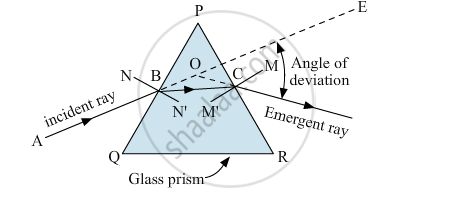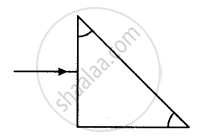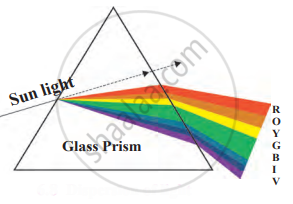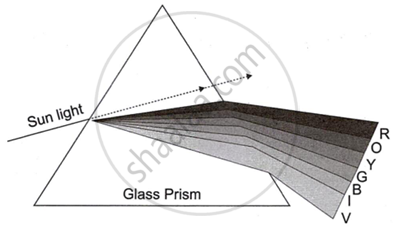Advertisements
Advertisements
Question
Draw a diagram to show the refraction of light through a glass prism. On this diagram, mark
(i) incident ray
(ii) emergent ray, and
(iii) angle of deviation.
Solution

APPEARS IN
RELATED QUESTIONS
Why do you not see a spectrum of colours when light passes through a flat pane of glass?
State the speed of light in (a) air, (b) water, and (c) glass
- A beam of monochromatic light undergoes minimum deviation through an equiangular prism, how does the beam pass through the prism, with respect to its base?
- If white light is used in the same way as in part (a) above, what change do you expect in the emergent beam?
- What conclusion do you draw about the nature of white light in part (b)?
In the diagram, a narrow beam of white light is incident on a right-angled isosceles prism. The critical angle of the material of prism for the yellow colour of white light is 45°. Complete the diagram to show the path of blue, yellow, and red colours of white light till they emerge out of the prism.

Observe the given figure and write appropriate phenomenon of light in the box.

Say TRUE or FALSE
After passing through a prism, white light splits into a band of seven colours
Why do we see a rainbow in the sky only after rainfall?
During dispersion of white light by prism placed in air, for a particular value of angle of prism,
A prism of refractive index `sqrt2` and refracting angle A produces minimum deviation δm of a ray on one face at an angle of incidence 45°, The values of A and δm are, respectively ______.
Observe the given diagram and answer the questions:

- Name the process shown in the figure.
- Name the colour that deviates the most.
- Name the colour that deviates the least.
- Name any one phenomenon in nature which is based on the above process.
- Define ‘spectrum’.
